Related Research Articles
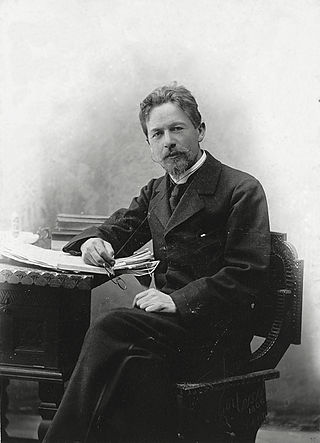
Anton Pavlovich Chekhov was a Russian playwright and short-story writer who is considered to be one of the greatest writers of all time. His career as a playwright produced four classics, and his best short stories are held in high esteem by writers and critics. Along with Henrik Ibsen and August Strindberg, Chekhov is often referred to as one of the three seminal figures in the birth of early modernism in the theatre. Chekhov was a physician by profession. "Medicine is my lawful wife", he once said, "and literature is my mistress."

Fyodor Mikhailovich Dostoevsky, sometimes transliterated as Dostoyevsky, was a Russian novelist, short story writer, essayist and journalist. Dostoevsky's literary works explore the human condition in the troubled political, social, and spiritual atmospheres of 19th-century Russia, and engage with a variety of philosophical and religious themes. His most acclaimed novels include Crime and Punishment (1866), The Idiot (1869), Demons (1872), and The Brothers Karamazov (1880). His 1864 novella, Notes from Underground, is considered to be one of the first works of existentialist literature. Numerous literary critics regard him as one of the greatest novelists in all of world literature, as many of his works are considered highly influential masterpieces.
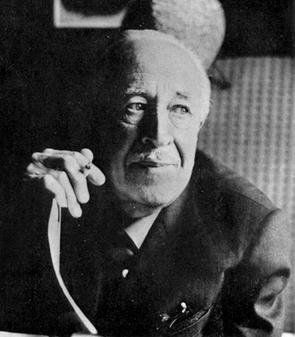
Lev Vladimirovich Kuleshov was a Russian and Soviet filmmaker and film theorist, one of the founders of the world's first film school, the Moscow Film School. He was given the title People's Artist of the RSFSR in 1969. He was intimately involved in development of the style of film making known as Soviet montage, especially its psychological underpinning, including the use of editing and the cut to emotionally influence the audience, a principle known as the Kuleshov effect. He also developed the theory of creative geography, which is the use of the action around a cut to connect otherwise disparate settings into a cohesive narrative.
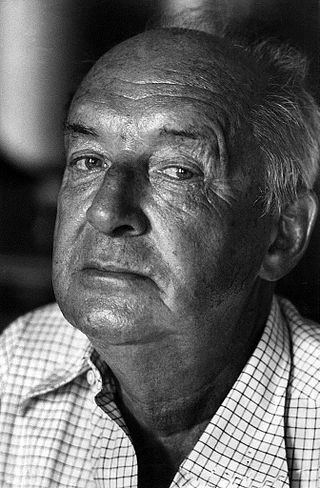
Vladimir Vladimirovich Nabokov, also known by the pen name Vladimir Sirin, was a Russian-American novelist, poet, translator, and entomologist. Born in Imperial Russia in 1899, Nabokov wrote his first nine novels in Russian (1926–1938) while living in Berlin, where he met his wife. He achieved international acclaim and prominence after moving to the United States, where he began writing in English. Nabokov became an American citizen in 1945 and lived mostly on the East Coast before returning to Europe in 1961, where he settled in Montreux, Switzerland.

Nikolai Vasilyevich Gogol was a Russian novelist, short story writer and playwright of Ukrainian origin.
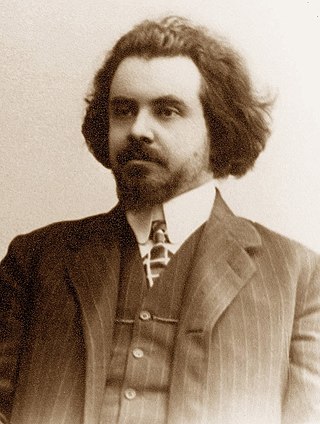
Nikolai Alexandrovich Berdyaev was a Russian philosopher, theologian, and Christian existentialist who emphasized the existential spiritual significance of human freedom and the human person. Alternative historical spellings of his surname in English include "Berdiaev" and "Berdiaeff", and of his given name "Nicolas" and "Nicholas".

Kazan Federal University is a public research university located in Kazan, Russia.

Saint Petersburg State University is a public research university in Saint Petersburg, Russia. Founded in 1724 by a decree of Peter the Great, the university from the beginning has had a focus on fundamental research in science, engineering and humanities.

Tatiana Anatolyevna Tarasova is a Russian figure skating coach and national figure skating team adviser. Tarasova has been coach to more world and Olympic champions than any other coach in skating history. Her students have won a total of eight Olympic gold medals in three of the four Olympic figure skating disciplines, in addition to 41 gold medals at the European and World championships.

The University of Lviv, presently the Ivan Franko National University of Lviv, is the oldest institution of higher learning in present-day Ukraine dating from 1661 when John II Casimir, King of Poland, granted it its first royal charter. Over the centuries, it has undergone various transformations, suspensions, and name changes that have reflected the geopolitical complexities of this part of Europe. The present institution can be dated to 1940. It is located in the historic city of Lviv in Lviv Oblast of Western Ukraine.

"Viy", also translated as "The Viy", is a horror novella by the writer Nikolai Gogol, first published in volume 2 of his collection of tales entitled Mirgorod (1835).
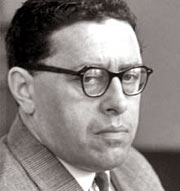
Yury Valentinovich Trifonov was a leading representative of the so-called Soviet "Urban Prose". He was considered a close contender for the Nobel Prize for Literature in 1981.
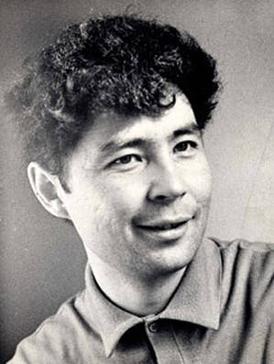
Alexander Valentinovich Vampilov was a Soviet playwright. His play The Elder Son was first performed in 1969, and became a national success two years later. Many of his plays have been filmed or televised in Russia. His four full-length plays were translated into English and Duck Hunting was performed in London and Washington DC.

Valery Yakovlevich Tarsis was a Ukrainian writer, literary critic, and translator. He was highly critical of the communist regime.
Nikolai Iosifovich Konrad was a Soviet philologist and historian, described in the Great Soviet Encyclopedia as "the founder of the Soviet school of Japanese scholars".
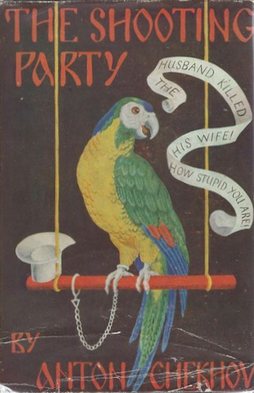
The Shooting Party is an 1884 novel by Anton Chekhov. It is his longest narrative work, and only full-length novel. Framed as a manuscript given to a publisher, it tells the story of an estate forester's daughter in a provincial Russian village, who is stabbed to death in the woods during a hunting party, and the efforts to uncover her killer.
Natalie Duddington was a philosopher and a translator of Russian literature into English. Her first name sometimes appears as Nathalie.
Patrick Miles is an English writer and translator. He was born in Sandwich, Kent and attended Sir Roger Manwood's Grammar School, then read Russian and German at Gonville and Caius College, Cambridge, graduating in 1971.

Zinaida Vengerova was a Russian literary critic and translator. She is considered one of the few women who were highly educated during her time, having studied in universities in Russia, France, and England. For her works, she had been described as "a literary ambassador between East and West". She also influenced the first generation of Russian symbolists through her writings about French symbolism.

Vladimir Viktorovich Kolesov was a Soviet and Russian linguist. He was a specialist in phonology, accentology, historical grammar and lexicography, philosophy of language and history of linguistics. Doctor of Philological Sciences (1969), Full Professor (1973), Honorary Professor of St. Petersburg State University (2018). Professor and Head of the Department of the Russian Language of the Faculty of Philology of St. Petersburg State University (1979‒2006).
References
- ↑ Laurence Senelick (13 August 2015). Historical Dictionary of Russian Theatre. Rowman & Littlefield Publishers. pp. 442–. ISBN 978-1-4422-4927-1.
- ↑ Neil Cornwell (2 December 2013). Reference Guide to Russian Literature. Routledge. pp. 863–. ISBN 978-1-134-26070-6.
- ↑ Evgeny Dobrenko; Marina Balina (17 February 2011). The Cambridge Companion to Twentieth-Century Russian Literature. Cambridge University Press. pp. 228–. ISBN 978-1-139-82823-9.
- 1 2 Law, Alma (2013-05-11). Aleksandr Vampilov: The Major Plays. Routledge. p. xiii. ISBN 978-1-13436-045-1.